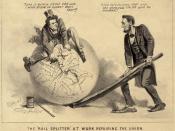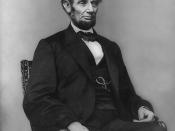The period in American history prior to the Civil War was known as the "Great Expansion". Economic boom followed the expansion of the railroads westward across the continent and southward into Florida. The Civil War punctuated Florida's growth but left it relatively unscathed. Economic growth quickly followed the end of the Civil War.
The Civil War split the nation. It was the most bitter conflict ever within the United States. The source of the conflict between the North and the South resulted from fundamentally different ways of life. Economy in the South was heavily based on agriculture and growing cotton. The North was heavily industrialised with factories and manufacturing being central to the growing economy.
Growing and harvesting cotton required large numbers of workers. In the southern states, many farmers "owned" whole workforces of slaves.
The combined workforce was in excess of 4 million slaves. By the 1800's, the African slave trade had been outlawed; existing slaves however were not freed.
Men and women of the North pushed to completely abolish slavery. The southern farmers regarded the opinions of the northerners as detached from reality. They did not want to be pushed around by the northern people, and The South feared that losing the slaves would have a severe economic impact on cotton plantations.
Abraham Lincoln was against slavery, but for unity. He knew the issues of slaves needed to be resolved, and that there was much discontent among right minded northern people, and intolerance of their southern neighbours' slave trading ways. Abe Lincoln knew that in order for the country to be united, and the union to be strong, a forced decision on slavery would have to be made. He would have been content with letting the southern states keep their slaves, if this would have retained unity in...


